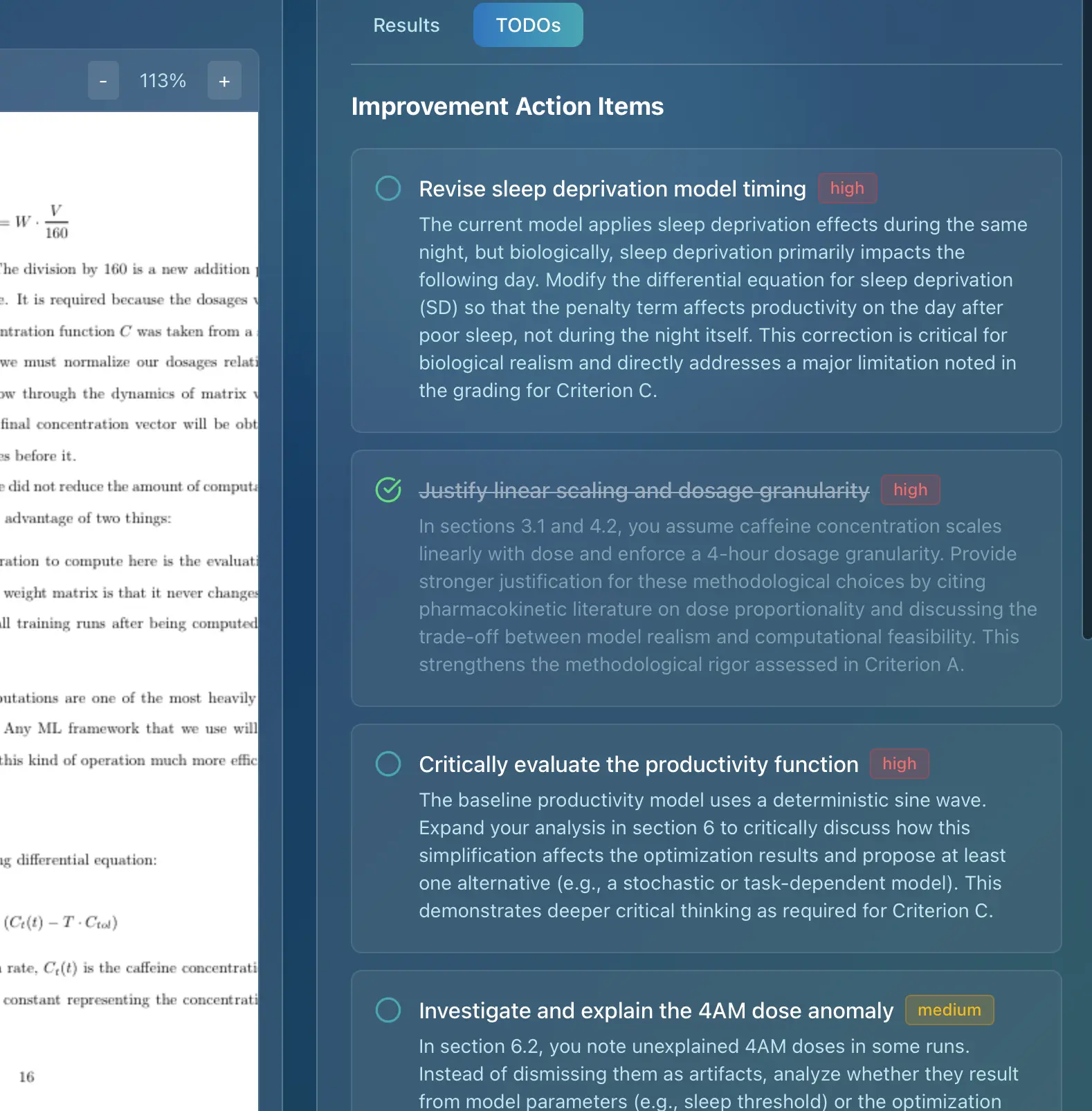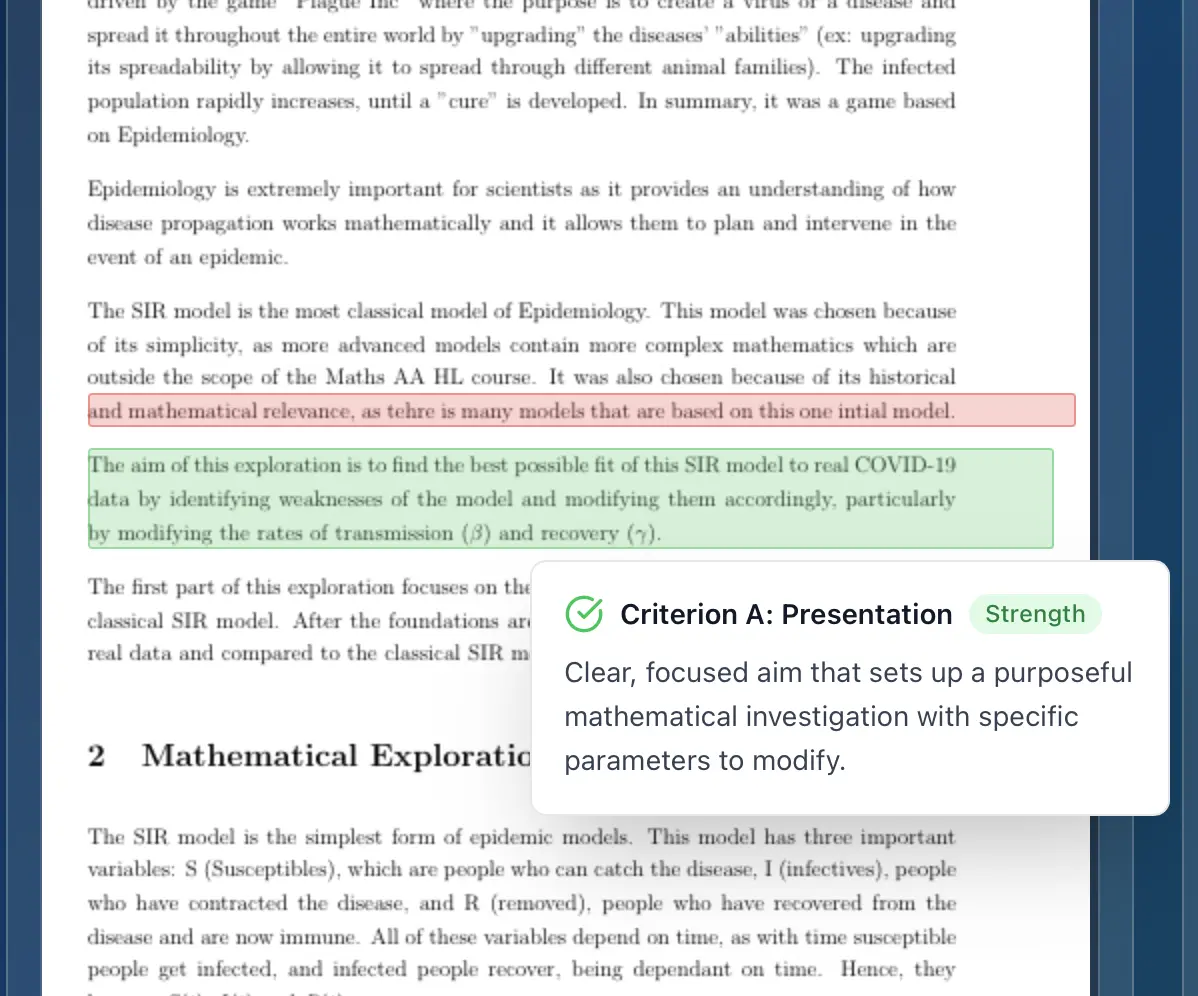Understanding IB Assessment Criteria Across All Subjects
Navigating the International Baccalaureate (IB) program can feel like deciphering a complex code, especially when it comes to understanding the assessment criteria. Whether you're an IB student aiming for top marks, a teacher striving to provide effective feedback, or a parent supporting your child's education, this guide provides a comprehensive overview of IB assessment across all subjects. We'll break down the core principles, explore common challenges, and offer actionable strategies to help you excel. From understanding the nuances of Internal Assessments (IAs) to mastering exam techniques, this guide will equip you with the knowledge and tools you need to succeed in the IB program.
The Foundation of IB Assessment: What You Need to Know
The IB Diploma Programme (DP) employs criterion-referenced assessment, meaning your work is evaluated against pre-defined standards rather than compared to the performance of your peers. This approach ensures fairness and consistency across different schools and countries. Understanding these criteria is paramount to achieving your desired grades.
The assessment criteria are divided into different strands, usually labeled A, B, C, and D (though the specific labels and content vary by subject). Each strand focuses on a specific skill or area of knowledge, and your performance is evaluated independently within each strand.
- Criterion-Referenced Assessment: Your work is judged against established standards, not against other students.
- Strands: Each subject has specific strands that assess different skills and knowledge areas.
- Levels of Achievement: Each strand has defined levels of achievement, ranging from 0 (lowest) to a maximum score (usually 6-8, depending on the subject and component).
Struggling with IB Assessments?
Get instant, detailed feedback on your work with AI that understands IB criteria.

Decoding IB Assessment: A Subject-by-Subject Overview
While the core principles of criterion-referenced assessment remain consistent, the specific criteria vary significantly across different IB subjects. Let's explore some key differences and common threads:
IB Language A: Literature/Language and Literature
- Focus: Analysis, interpretation, and evaluation of literary texts.
- Key Criteria: Understanding of literary devices, critical thinking, and effective communication.
- Internal Assessment (IA): Typically involves a written commentary or oral presentation analyzing a chosen text.
- Exam Strategies: Practice close reading, develop strong analytical skills, and master essay writing techniques.
IB Language B: Language Acquisition
- Focus: Developing proficiency in a second language.
- Key Criteria: Communication, comprehension, and cultural understanding.
- Internal Assessment (IA): Often involves an oral assessment and a written assignment demonstrating language skills.
- Exam Strategies: Practice speaking and writing in the target language, expand your vocabulary, and familiarize yourself with different text types.
IB Individuals and Societies (History, Economics, Geography, etc.)
- Focus: Understanding social, economic, and political issues.
- Key Criteria: Knowledge and understanding, application and analysis, synthesis and evaluation, and use of subject-specific terminology.
- Internal Assessment (IA): Typically involves a research-based essay or project.
- Exam Strategies: Develop strong research skills, practice essay writing, and understand different perspectives on complex issues.
IB Sciences (Biology, Chemistry, Physics)
- Focus: Understanding scientific concepts and applying them to real-world problems.
- Key Criteria: Knowledge and understanding, application, analysis, evaluation, and practical skills.
- Internal Assessment (IA): Involves a scientific investigation or experiment.
- Exam Strategies: Master scientific concepts, practice problem-solving, and develop strong experimental skills.
IB Mathematics (Analysis and Approaches, Applications and Interpretation)
- Focus: Developing mathematical skills and applying them to solve problems.
- Key Criteria: Knowledge and understanding, problem-solving, communication, and mathematical reasoning.
- Internal Assessment (IA): Involves a mathematical exploration or investigation.
- Exam Strategies: Practice problem-solving, understand mathematical concepts, and develop strong reasoning skills.
IB Arts (Visual Arts, Music, Theatre)
- Focus: Developing artistic skills and expressing creativity.
- Key Criteria: Knowledge and understanding, application, analysis, evaluation, and personal engagement.
- Internal Assessment (IA): Involves creating a portfolio of artwork, performing a musical piece, or directing a theatrical production.
- Exam Strategies: Develop strong artistic skills, understand artistic concepts, and express your creativity effectively.
Mastering the Internal Assessment (IA): A Critical Component
The Internal Assessment (IA) is a significant component of your IB grade, often accounting for 20-30% of your final mark. It's a chance to demonstrate your understanding of the subject matter through independent research and analysis.
- Choose a Topic Wisely: Select a topic that genuinely interests you and aligns with your strengths.
- Follow the Guidelines: Carefully review the IA guidelines for your subject and adhere to them meticulously.
- Plan Your Time: Break down the IA into smaller, manageable tasks and create a realistic timeline.
- Seek Feedback: Ask your teacher for feedback on your IA proposal and drafts.
- Proofread Carefully: Ensure your IA is free of grammatical errors and typos.
Example: History IA
A student choosing to investigate the causes of the Russian Revolution would need to:
- Clearly define their research question.
- Conduct thorough research using credible sources.
- Analyze the historical context and different perspectives.
- Present their findings in a well-structured and coherent essay.
Common Challenges and Mistakes in IB Assessment
Students often struggle with specific aspects of IB assessment. Here are some common challenges and how to overcome them:
- Misunderstanding the Criteria: Many students fail to fully understand the assessment criteria, leading to misdirected efforts. Solution: Carefully review the assessment criteria for each subject and component, and ask your teacher for clarification if needed.
- Poor Time Management: Procrastination and poor time management can lead to rushed and incomplete work. Solution: Create a realistic timeline for each assessment and stick to it. Break down large tasks into smaller, manageable steps.
- Lack of Critical Thinking: Superficial analysis and a lack of critical thinking can limit your ability to achieve higher marks. Solution: Develop strong analytical skills by practicing close reading, evaluating evidence, and forming your own opinions.
- Insufficient Evidence: Failing to provide sufficient evidence to support your claims can weaken your arguments. Solution: Use credible sources to support your claims and provide specific examples to illustrate your points.
- Neglecting the Rubric: Ignoring the specific rubric for a task is a surefire way to lose points. Solution: Treat the rubric as your roadmap. Ensure every element of your work directly addresses the rubric's requirements.
Pro Tip: Get AI-Powered Grading
Stop second-guessing your grades. Get instant feedback aligned with official IB rubrics.

Advanced Tips and Strategies for IB Success
To truly excel in the IB program, consider these advanced tips and strategies:
- Develop Strong Study Habits: Create a consistent study schedule and find a study environment that works for you.
- Seek Help When Needed: Don't hesitate to ask your teachers, classmates, or tutors for help when you're struggling.
- Practice Past Papers: Practicing past papers is an excellent way to familiarize yourself with the exam format and types of questions.
- Stay Organized: Keep track of your assignments, deadlines, and notes in an organized manner.
- Manage Stress: The IB program can be demanding, so it's important to manage stress effectively. Get enough sleep, eat healthy, and exercise regularly.
- Understand Command Terms: IB exams use specific command terms (e.g., "analyze," "evaluate," "compare") that dictate how you should answer the question. Make sure you understand what each command term requires.
Technology and Modern Assessment: The Role of AI
Technology is rapidly transforming education, and the IB program is no exception. AI-powered tools are becoming increasingly valuable for both students and teachers.
For students, AI can provide personalized learning experiences, identify areas for improvement, and offer targeted feedback. For teachers, AI can automate grading tasks, provide detailed insights into student performance, and free up time for more individualized instruction.
Marksy is a leading AI grading assistant specifically designed for the International Baccalaureate (IB). It provides instant, accurate, and detailed feedback on student work based on official IB rubrics. Marksy helps teachers provide consistent, criterion-by-criterion feedback, saving them valuable time while ensuring assessment quality. Students benefit from understanding exactly how to improve their work, leading to better outcomes. Marksy uses official IB criteria to ensure accuracy and fairness, providing a valuable tool for both educators and students.
The use of AI in assessment is not about replacing human judgment but about augmenting it. AI can handle the tedious and time-consuming aspects of grading, allowing teachers to focus on providing personalized support and guidance to their students.
Conclusion: Your Path to IB Success
Understanding IB assessment criteria is crucial for success in the International Baccalaureate program. By mastering the core principles, understanding the specific criteria for each subject, and avoiding common mistakes, you can significantly improve your chances of achieving your desired grades. Remember to seek help when needed, practice consistently, and leverage the power of technology to enhance your learning experience.
Ready to take your IB performance to the next level? Try Marksy for free today and experience the power of AI-powered feedback! Streamline your grading workflow and help your students understand exactly how to improve their work. Sign up for a free trial now!